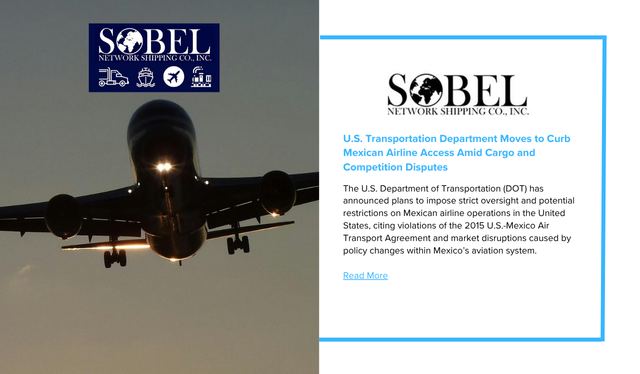The U.S. Department of Transportation (DOT) has announced plans to impose strict oversight and potential restrictions on Mexican airline operations in the United States, citing violations of the 2015 U.S.-Mexico Air Transport Agreement and market disruptions caused by policy changes within Mexico’s aviation system.
The DOT’s move follows concerns over the Mexican government’s 2023 decision to relocate all-cargo carriers from Mexico City International Airport (MEX) to the more remote and underdeveloped Felipe Angeles International Airport. The transition has added complexity and cost for many freight carriers—particularly those with hybrid cargo-passenger operations—leading to logistical strain and increased infrastructure spending.
Beyond logistics, the DOT claims the sudden slot restrictions at MEX and lack of assurances for U.S. carriers amount to anti-competitive behavior that undermines fair market access.
DOT’s Proposed Actions Include:
-
Requiring Mexican airlines to file detailed schedules for all U.S. flights by July 29.
-
Banning large charter aircraft operations to and from the U.S. without prior approval.
-
Moving to revoke antitrust immunity for the joint venture between two major U.S. and Mexican airlines, unless conditions are rectified.
If finalized, these measures would limit coordinated pricing and revenue-sharing activities between cross-border partners but would still allow codesharing and loyalty integrations. The DOT emphasized it reserves the right to disapprove future flight requests should corrective action not be taken.
Implications Extend Beyond Mexico
The DOT also issued a warning to European nations regarding unilateral restrictions on U.S. carriers that could breach Open Skies agreements. Notably, earlier concerns about Amsterdam Schiphol’s slot reductions—intended to cut noise and emissions—have already raised the possibility of U.S. retaliatory measures.
As global aviation adjusts to evolving infrastructure, regulatory, and environmental demands, these moves underscore the ongoing geopolitical complexities affecting air cargo and passenger networks.


